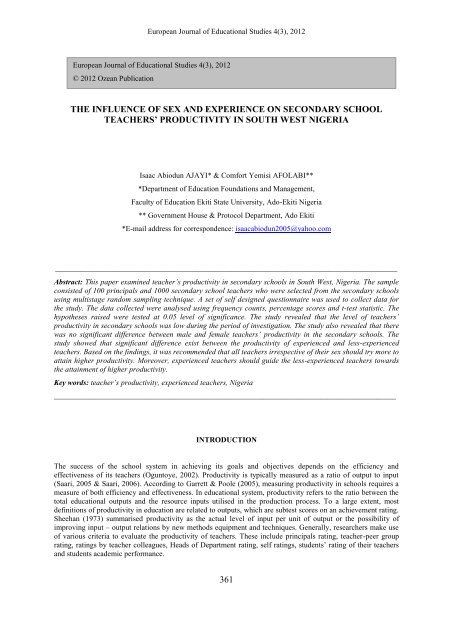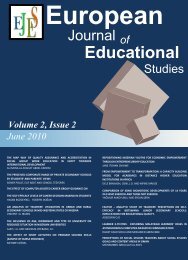Volume 4 Issue 3 (October 2012) - Ozean Publications
Volume 4 Issue 3 (October 2012) - Ozean Publications
Volume 4 Issue 3 (October 2012) - Ozean Publications
Create successful ePaper yourself
Turn your PDF publications into a flip-book with our unique Google optimized e-Paper software.
European Journal of Educational Studies 4(3), <strong>2012</strong><br />
European Journal of Educational Studies 4(3), <strong>2012</strong><br />
© <strong>2012</strong> <strong>Ozean</strong> Publication<br />
THE INFLUENCE OF SEX AND EXPERIENCE ON SECONDARY SCHOOL<br />
TEACHERS’ PRODUCTIVITY IN SOUTH WEST NIGERIA<br />
Isaac Abiodun AJAYI* & Comfort Yemisi AFOLABI**<br />
*Department of Education Foundations and Management,<br />
Faculty of Education Ekiti State University, Ado-Ekiti Nigeria<br />
** Government House & Protocol Department, Ado Ekiti<br />
*E-mail address for correspondence: isaacabiodun2005@yahoo.com<br />
__________________________________________________________________________________________<br />
Abstract: This paper examined teacher’s productivity in secondary schools in South West, Nigeria. The sample<br />
consisted of 100 principals and 1000 secondary school teachers who were selected from the secondary schools<br />
using multistage random sampling technique. A set of self designed questionnaire was used to collect data for<br />
the study. The data collected were analysed using frequency counts, percentage scores and t-test statistic. The<br />
hypotheses raised were tested at 0.05 level of significance. The study revealed that the level of teachers’<br />
productivity in secondary schools was low during the period of investigation. The study also revealed that there<br />
was no significant difference between male and female teachers’ productivity in the secondary schools. The<br />
study showed that significant difference exist between the productivity of experienced and less-experienced<br />
teachers. Based on the findings, it was recommended that all teachers irrespective of their sex should try more to<br />
attain higher productivity. Moreover, experienced teachers should guide the less-experienced teachers towards<br />
the attainment of higher productivity.<br />
Key words: teacher’s productivity, experienced teachers, Nigeria<br />
__________________________________________________________________________________________<br />
INTRODUCTION<br />
The success of the school system in achieving its goals and objectives depends on the efficiency and<br />
effectiveness of its teachers (Oguntoye, 2002). Productivity is typically measured as a ratio of output to input<br />
(Saari, 2005 & Saari, 2006). According to Garrett & Poole (2005), measuring productivity in schools requires a<br />
measure of both efficiency and effectiveness. In educational system, productivity refers to the ratio between the<br />
total educational outputs and the resource inputs utilised in the production process. To a large extent, most<br />
definitions of productivity in education are related to outputs, which are subtest scores on an achievement rating.<br />
Sheehan (1973) summarised productivity as the actual level of input per unit of output or the possibility of<br />
improving input – output relations by new methods equipment and techniques. Generally, researchers make use<br />
of various criteria to evaluate the productivity of teachers. These include principals rating, teacher-peer group<br />
rating, ratings by teacher colleagues, Heads of Department rating, self ratings, students‘ rating of their teachers<br />
and students academic performance.<br />
361

















